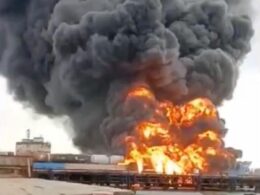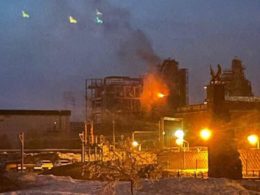Politico reports that a wave of Ukrainian drone strikes on oil refineries deep inside Russia has left the country running low on petrol.
Ukraine’s intensified offensive against Russia’s oil infrastructure to disrupt fuel supplies to the Russian military and reduce the Kremlin’s war-funding revenues from petroleum exports.
On 1 May Russian Telegram channel Astra reported that Ryazan refinery in Russia was attacked by UAV drones, causing a fire at the plant.
According to Politico, "Diesel prices for Russian consumers have skyrocketed, rising almost 10 percent in the past week alone, according to the government's figures."
It also states that "Petrol costs have also hit a six-month high, up more than 20 percent from the start of the year as supply tightens and more and more facilities are forced to suspend production."
A former British military intelligence officer and NATO planner Philip Ingram said, "It's like a mosquito — when you can't find it, can't kill it and it keeps coming back night after night, you're going to be exhausted. It's a very good way of taking the pressure off from the front lines."
Politico reports that Moscow has scaled back its fuel exports to near-historic lows, shipping just over 712,000 tons of diesel and gasoil last week, compared to more than 844,000 during the same week in 2023. Igor Yushkov, an analyst with Russia's National Energy Security Fund said, "Prices were unlikely to go down anytime soon — and the country may even need to import gasoline from reserves stored in neighboring Belarus."
US Defense Secretary Austin criticized the Ukrainian strikes on Russian oil refineries, claiming they have “a knock-on effect in terms of the global energy situation.”
The British Defense Ministry reported
on 16 April that Ukrainian drone attacks “demonstrate the ability of the Ukrainian Armed Forces to reach deep into Russia, evade Russian air defense, and locate any supporting functions of the war.”
According to the British Defense Ministry, "Russia struggles to protect such facilities and is likely content to balance the risk to sites staffed by civilians in favor of maintaining their focus on the frontline.”
Read also:
- Expert: Ukraine’s persistent drone strikes could disrupt Russian war machine, trigger fuel deficit
- US authorizes Russian bank transactions for energy payments amid sanctions
- NATO chief: Ukraine’s trust in allies dented by aid delays





